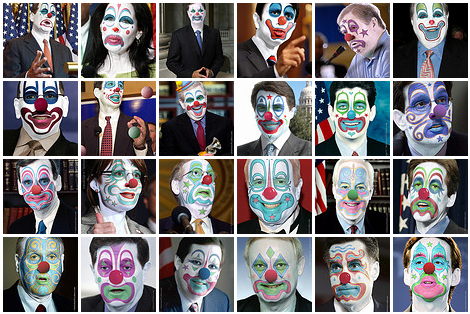leveymg
leveymg's JournalQuantitative Easing (QE) is the Monetarist alternative to just printing money.
In the 20th Century, central banks used to stimulate the economy during recessions by inflating the money supply with extra currency. That put more dollars into circulation, which stimulated consumption. However, that approach risked devaluation of the currency and hyper-inflation.
Today, instead, the Fed lowers interest rates to a point where it is actually cheaper (and more profitable) for the commercial banks to borrow money than to hold onto other assets. The banks use those assets (corporate bonds, securitized mortgages and loans) as collateral to borrow dollars or buy government bonds (which can be swapped for cash on the multi-trillion Dollar Repo market).
QE is a variation on the strategy of zero or negative real interest rate financial stimulus applied in Japan after the collapse of its commercial real estate bubble in 1991 that has allowed the Japanese economy to keep limping along on export earnings despite the loss in domestic speculative market values.
Because the system operates by keeping interest rates (the cost of borrowing) lower than inflation, the Fed's key policy is always to keep consumer demand depressed below the bank's demand for money. "Too much" consumer spending can lead to demand inflation, which would reduce the profit margin for the banks (if interest rates are kept low). Therefore, we see that the Fed's actual policy is austerity for consumers to depress demand at the bottom in order to sustain profitability at the top - the result is the jobless recovery and declining purchasing power for the middle-class, meanwhile the financial markets and bank sector profits reach record highs, all of which are quite intentional outcomes of QE programs.
No deal. The GOP will simply have to cave on this one or risk the wrath of Wall St with default
And, they won't do that.

The Death Penalty for every crazy in the Clown Car


RESPONSE TO POST: "What Should Democrats Demand in the Budget Showdown?"
Selective Shutdown Over for Pentagon. The Light just got turned on the Kabuki Theater Stage
In other words, the Tea Party got EXACTLY what they wanted from the SELECTIVE shutdown of the federal government. What did the Democrats gain from this?

The federal government just got shrunk in a bathtub without anyone in the Democratic ledger having to go on record to vote directly for it, and the military is exempted from having its trousers taken in. Jitters about the Debt Ceiling aside, Wall Street is exultant about the Sequester and partial shutdown. The NASDAQ was up 7 or 8 percent in September, and the Dow has risen nearly 15% since the Sequester started.
The GOP got exactly what they wanted, and if his past statements are any indication, Obama IS willing to give them more than half of what they want, at least in Social Security program cuts.
Source: AP
The Pentagon is ordering most of its approximately 400,000 furloughed civilian employees back to work.
The decision by Defense Secretary Chuck Hagel is based on a Pentagon legal interpretation of a law called the Pay Our Military Act.
That measure was passed by Congress and signed by President Barack Obama shortly before the partial government shutdown began Tuesday.
The Pentagon did not immediately say on Saturday exactly how many workers will return to work. The Defense Department said "most" were being brought back.
Read more: http://abcnews.go.com/Politics/wireStory/pentagon-furloughed-civilians-ordered-back-20482298
The GOP now has absolutely zero reason to make any deals until 10/17, and then Obama will give them at least 50% of what they want in the way of cuts to Social Security because it's what he and the Wall Street wing of the Democratic Party want, too.
 There are those who suggest the GOP will have to cave. How does the GOP have to cave? All they have to do is vote on the 17th for a CR to avoid federal default, something the financial sector and most corporations would never permit.
There are those who suggest the GOP will have to cave. How does the GOP have to cave? All they have to do is vote on the 17th for a CR to avoid federal default, something the financial sector and most corporations would never permit.
So, what are the Republicans really giving up? Most of the GOP is not opposed to a personal mandate (which is Romneycare, after all) - they're just making noise about Obamacare to keep their base happy. Obama has already indicated he's happy to give them cuts to Social Security and Medicare and some other (unstated) social programs as part of a Grand Bargain.
How are the Republicans going to cave if they sign a CR? You tell me - what are they really going to give up?
It's no longer chaotic when it gets predictable. It's a game both sides are playing to appease Wall
St. that loves the Sequester/Slowdown because it means the Federal Gov't is spending and regulating less, which is what they demanded to begin with. A federal default on the Debt would be something else, so that won't happen.
Sequester and partial shutdowns are Austerity by means other than the normal political process which would ordinarily require that the pols in both parties vote on it - a vote on the record for austerity is something that neither party really wants. So, everyone plays this game instead.
On Wall St, the Shutdown and Sequester prompt rally. Austerity brings cheers and a buying mood.
 As hundreds of thousands of federal workers faced the first day of unpaid furloughs, investors and Republican lawmakers were in a jubilant, upbeat mood. Six months into the Sequester, stock markets are at new highs, the NASDAQ is up six percent during September.
As hundreds of thousands of federal workers faced the first day of unpaid furloughs, investors and Republican lawmakers were in a jubilant, upbeat mood. Six months into the Sequester, stock markets are at new highs, the NASDAQ is up six percent during September.
If one sees the world in terms of who gains and who loses, the seeming GOP hysterics over Obamacare that forced a partial federal shutdown make complete sense. Viewed in financial terms, the political crisis over Obamacare is actually just a rational pretext to cut several weeks off federal payrolls with a like reduction in budget outlays. The ones who bear the brunt are individual workers, not big companies with ongoing, multi-year federal contracts.
- $$$ -
 ?9d7bd4
?9d7bd4
Stock markets were up Tuesday, on the first day of the federal government's shutdown.
The NASDAQ Composite was up more than 1 percent yesterday. The S&P 500 was up roughly 0.75 percent, and the Dow rose about 0.4 percent.
Each exchange is also up over the past month. The NASDAQ is up 6 percent since the beginning of September, while the Dow is up by about 2.6 percent.
Considering that corporations and businesses are exempt from the ACA for a year they should be happy. Many companies are telling their employees to sign up for ACA because the employer will no longer pay for their insurance, with a corresponding boost to the corporate bottom line, higher share values and added dividends that can be turned over to stockholders.
Austerity by Default
What else might explain the laissez-faire attitude among investors to political crisis? The lockup in Washington and the teetering of the government in Rome both present opportunities for global investors with a plan. Since the selective shutdown of federal services largely impacts middle-and low-income individuals rather than large businesses, it looks like a win-win to financial markets. Economic and political crisis accompanying austerity across Europe have not resulted in an electoral turn to the left. Not surprisingly, therefore, investment advisers aren't upset by either event, as this sampling of comment yesterday by Reuters shows:
"There's no easy way to trade unknown factors. One way is to take a view, but you're either horribly right or horribly wrong," he said.
For long-term investors to change their views, and thus spark sharp market moves, political instability would have to dent economic growth or trigger high and sustained volatility.
"The key challenge is trying to understand whether any bout of political volatility is sufficiently large to alter the path of the economy," said Mike Amey, UK portfolio manager at PIMCO, the world's largest bond fund.
"Ultimately, we doubt that this will be the case in either Washington or Rome," said Amey, who manages 8 billion pounds ($13 billion) of assets. http://www.reuters.com/article/2013/10/02/markets-politics-idUSL6N0HR2T720131002
Here's the central lesson of the current global Policy of Government Austerity by Default: what looks like political crisis on the outside is really a financial windfall and another government bail-out of global banks.
Netanyahu has not RSVPed. Maybe we should send a car to pick him up?
Is there some reason pressure isn't put on Israel to ratify the NPT and get rid of its own chemical and biological weapons?

RESPONSE TO POST: "Russia moves to revive plans for conference on WMDs in Middle East"
Libya is a model of democratization we can apply across the region.

(RESPONSE TO POST: "3 Libyan army officers assassinated in Benghazi"
Very good choice. That thing would walk away from a Bell Ranger if set up right.
I still prefer this '67 model with the same engine, personally:

Stevens was no ordinary Ambassador - he was a career spook diplomat. The DOS and CIA overlap in
many ways as far as the execution of covert action is concerned. You are right, probably more so under Secretary Clinton than in the past. You only need to look at Steven's background -- he attended UC Berkeley, UC Hastings Law and the National War College -- to see that he is a melding of the martial and intellectual in the tradition of Teddy Roosevelt or T.E. Lawrence. He has worked in every significant center of foreign policy-making and every posting in the Mideast where the US has intense covert activities and strategic relationships during the past two decades:
He had served in Libya twice previously: as the Deputy Chief of Mission (from 2007 to 2009) and as Special Representative to the National Transitional Council (from March 2011 to November 2011) during the Libyan revolution. He arrived in Tripoli in May 2012 as the U.S. Ambassador to Libya.[4]
There were actually over 50 CIA people based in the nearby compound who showed up at the airport for evacuation. That's the "Annex" group of buildings next to the 14 large storage units in the adjacent warehouses where some have speculated the CIA actually stored the missiles and other sophisticated armaments that had been seized and purchased during the previous year. So, Stevens probably thought he was reasonably safe, as help or refuge was less than 1/2 a mile away from his unfortified diplomatic compound. He was comfortable with the militant groups he worked with in Eastern Libya - after all, he had handed them independence.

Profile Information
Member since: Wed May 5, 2004, 09:44 AMNumber of posts: 36,418